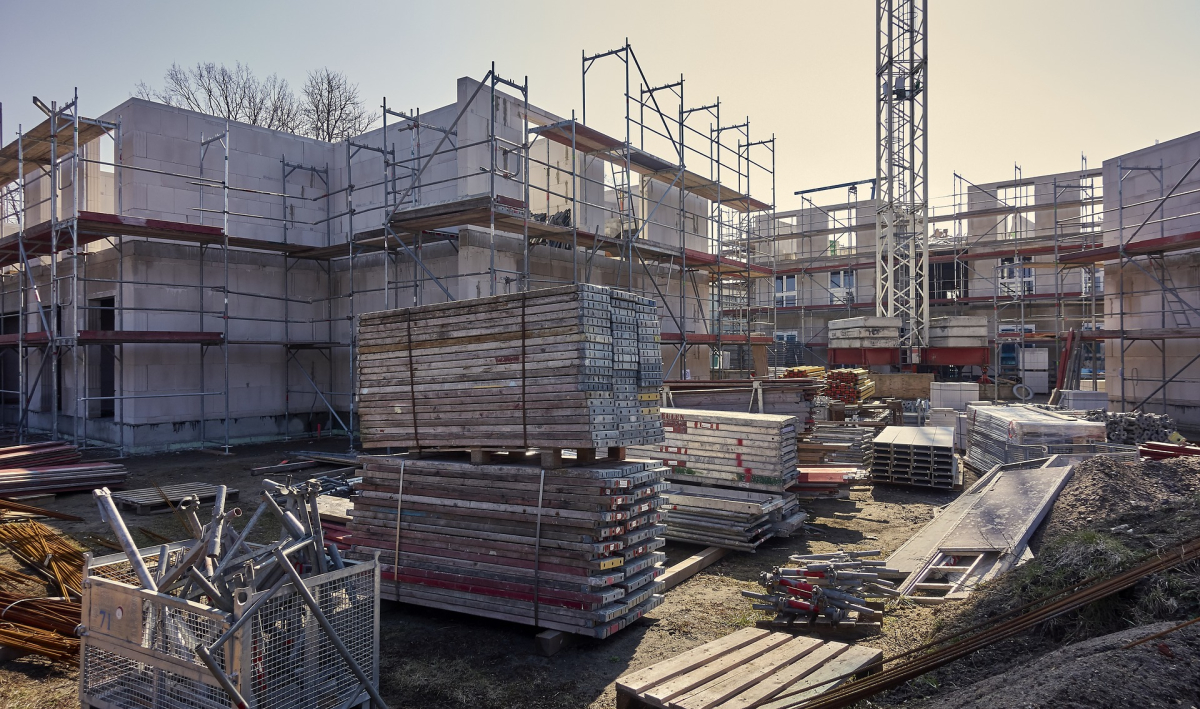Valuation for corporate insolvencies
In turbulent times, more companies than ever are facing insolvency. According to our data alone, this affects around 400 project developments and countless existing properties. Ideally, valuations for insolvency administrations show more than the actual value.
A central role in insolvency proceedings is played by the valuation of property, which is often one of a company's most valuable assets or, in the case of portfolio holders and project developers, the main purpose of the company.
Data confirms increase
First a look at our data. As part of our ‘Development Monitor’ tool, bulwiengesa has been analysing the insolvencies of project developers since 2023. Currently, 30 insolvent project developers are recorded and their insolvency status documented. A total of 400 properties with a total usable area of 3.3 million square metres have been recorded, of which residential properties are the most affected at around 50 %, followed by office projects at 30 %. 20 % of the project developments are existing properties owned by insolvent companies. This is not a complete record, as small project developers in particular often go unnoticed. Nevertheless, many high-volume developers were recorded, which brings the volume and speed of the difficulties encountered to a new dimension in our more than 40 years of observing the sector.
Properties of non-real estate companies
The number of existing properties owned by insolvent companies, including those whose corporate purpose is not directly related to property, is likely to be significantly higher. However, there is no reliable data on this, as it is generally not known whether a company is the owner or tenant of a property in the case of insolvencies. According to a press release issued by the Federal Statistical Office in May 2024, 31.1% more corporate insolvencies were recorded in February 2024 than in February 2023.
Not all insolvencies necessarily involve a property, but this is likely to be the case very often. Overall, it is clear that the sector is currently being hit hard.
Importance of property valuation in insolvencies
In a company insolvency, the aim is to identify, value and realise the company's assets in order to satisfy the creditors' claims as far as possible. In many cases, real estate accounts for a significant proportion of the company's assets. A precise valuation is essential
Support for the insolvency administrator
The insolvency administrator needs an accurate valuation in order to make informed decisions about the sale or other realisation of the property.
Information for creditors
Creditors must be informed about the value of the property in order to place their claims appropriately and negotiate repayments.
Ensure transparency
A transparent and comprehensible valuation creates trust among all parties involved and minimises the risk of legal disputes.
Sell or reposition?
Experience shows that insolvency administrators often require further information in addition to the pure valuation of the undeveloped property, the project development that has been started or the existing property.
Existing properties
In the case of existing properties, the question of the costs of repositioning is regularly raised; the focus here is on conversion and subsequent utilisation concepts as well as further market development with a particular focus on reducing any vacancies. If there are defects and damage to the property that stand in the way of optimal economic utilisation, the need for investment is regularly presented in order to leverage potential for value appreciation, for example through a Manage-to-ESG programme to make the building fit for the future.
Projects under constructionProjects under construction
In the case of project developments that have already begun, i.e. are under construction, the primary question is whether the project development should be sold in its current state or completed. To this end, the costs for completion or repositioning must be calculated and liquidity planning must be carried out on this basis. The greatest possible transparency is achieved through supplementary activities such as an objective building status check and the plausibility check of the construction time required to complete the project that has been started.
Challenges and special aspects
The valuation of real estate in the context of corporate insolvency is often associated with special challenges:
Market uncertaintyMarket uncertainty
Insolvencies often occur in difficult economic times, when the property market is volatile and prices are uncertain. This makes it difficult to forecast future value trends, particularly in a market environment that continues to be characterised by a low number of transactions.
Specialised properties
Companies often own special properties, such as production or industrial properties, whose valuation is more complex, requires special expertise and, in particular, requires a distinctive data basis.
Quick sale
In many insolvency proceedings, the property must be sold quickly, which can naturally lead to discounts on the sale price due to the shorter marketing period. A careful balance must be struck between a quick sale and optimum value realisation.
Goal: fair realisation at the best possible property valu
Determining the value of real estate in connection with corporate insolvencies is a complex and critical process. A precise and transparent valuation is essential in order to protect the interests of creditors and ensure a fair realisation of the company's assets. In a volatile market environment, it is a particular challenge to realise the best possible value for the property.
Contact: Marcus Badmann, Managing Director bulwiengesa appraisal GmbH, Phone +49 69-75 61 467 59, badmann@bulwiengesa.de
You might also be interested in
For our magazine, we have summarized relevant topics, often based on our studies, analyses and projects, and prepared them in a reader-friendly way. This guarantees a quick overview of the latest news from the real estate industry.
Little movement on the German real estate market
For the eleventh time, bulwiengesa presents its comprehensive analysis of the German real estate markets. The results of this year's 5% study, conducted in collaboration with ADVANT Beiten, show that the German real estate market is characterized by widespread stagnation. At the same time, niche segments are becoming increasingly attractive. The market is increasingly rewarding professional asset management and specialist knowledge—a trend that separates the wheat from the chaffFive per cent returns no longer illusory even for core properties
The ‘5% study - where investing is still worthwhile’ celebrates its tenth anniversary. Since the first edition was published, the German property market has tarnished its reputation as a safe investment haven. Higher yields are now within sight, even for prime properties, and even residential property is increasingly becoming a profitable asset class again. The market is more exciting than it has been for a long timeProject developments: Few in planning, many postponed
The crisis is now clearly visible among project developers. The market in the seven class A cities is declining, and the traditional project developers in particular are withdrawing from the market. Residential projects, of all things, are significantly affected. And: Many projects are being completed later than plannedInteresting publications
Here you will find studies and analyses, some of which we have prepared on behalf of customers or on our own initiative based on our data and market expertise. You can download and read many of them free of charge here.







